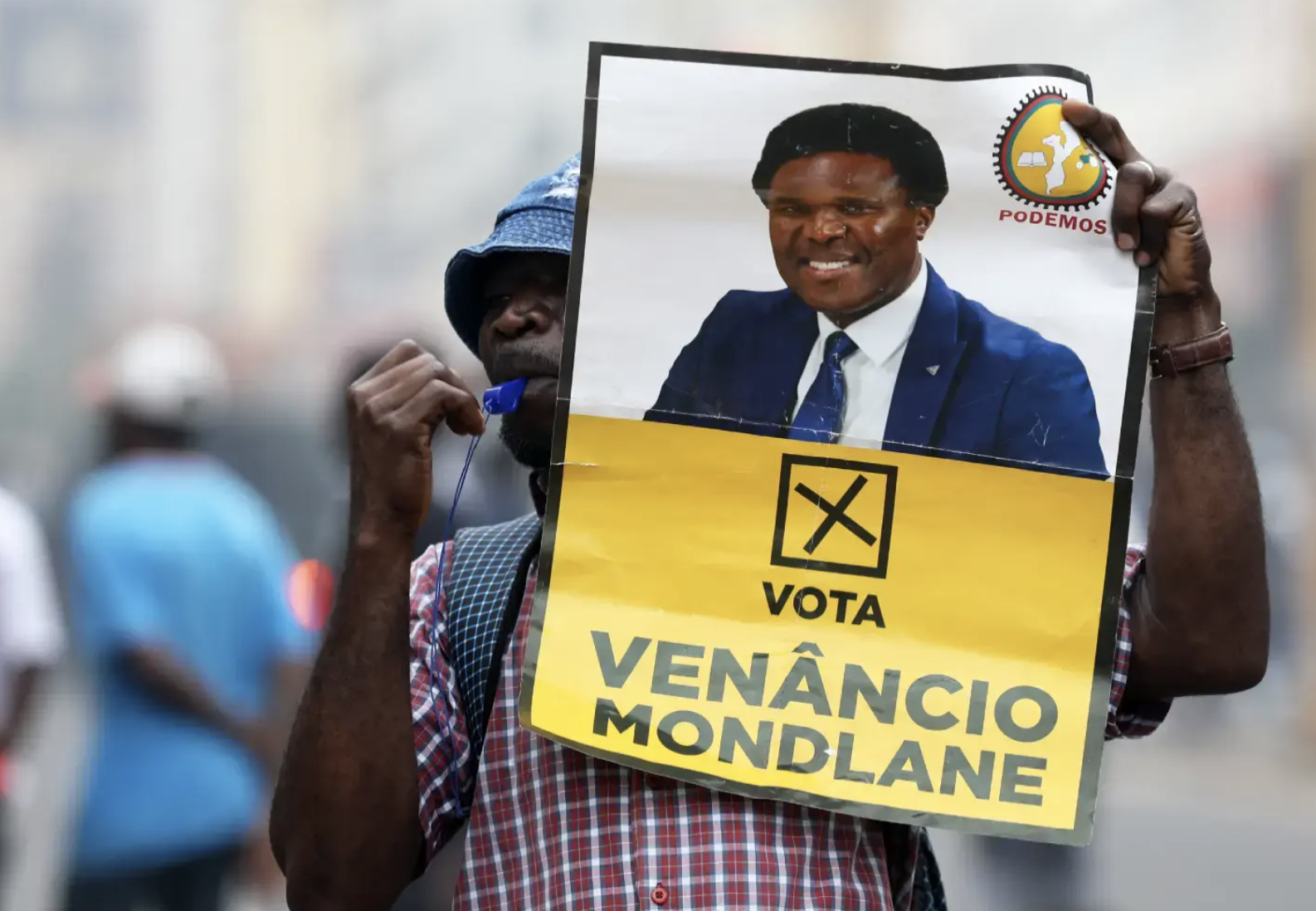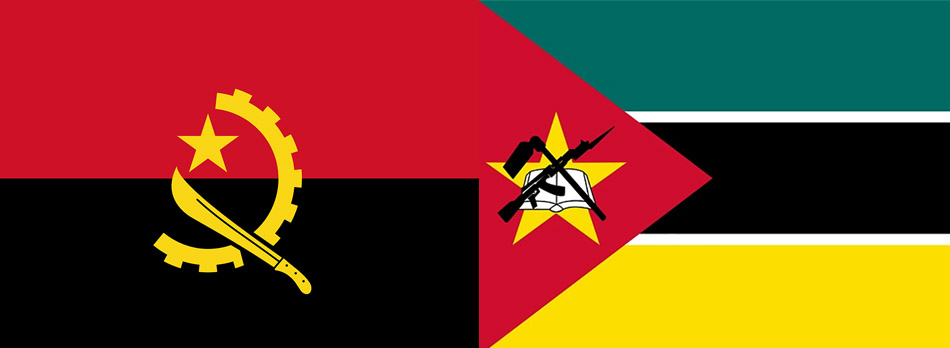News
Mozambique Opposition Vows to Lead ‘Spearhead’ Protests
As opposition leader Venâncio Mondlane prepares for a new wave of protest, to prevent the crisis from escalating further he has called on President Cyril Ramaphosa to review the ANC’s position congratulating Frelimo on the election result.

Former Director, The Brenthurst Foundation

Former Research Director, The Brenthurst Foundation

Mozambican opposition leader Venâncio Mondlane has vowed to return to the country to lead a new wave of protest as the country prepares to swear in President Daniel Chapo on 15 January following a questionable election result from polls held on 9 October 2024.
Asked if he feared for his life when he returned to the country, he said: “Probably they can arrest me if they don’t shoot me.”
Mondlane said in an interview with these authors that this new wave of protest would be nationwide and the “pacific and public” demonstration would continue indefinitely. Until now, the opposition has mounted targeted demonstrations for limited periods.
Mondlane is the leader of the main opposition party, Podemos (Optimist Party for the Development of Mozambique), which obtained 20% of the vote – upgraded to 24% by the country’s constitutional court. Mondlane is adamant that his party won the election based on a count of publicly available results.
Podemos is supported by several Frelimo luminaries. The party was established in 2018 when Mozambique’s electoral court – demonstrating its partiality – prevented Samora Machel Jnr, the son of Samora Machel – from standing as an independent for the position of mayor of Maputo. Many members of the Youth Association for the Development of Mozambique (Ajuden) – historically a Frelimo-aligned institution – have defected to Podemos.
According to the EU Election Observation Mission, there were “irregularities during counting and unjustified alteration of results at polling station and district level”.
Even Frelimo members think that it’s time for change, for transition, for a democratic alternative.
“The government used brutal force against the people and now the Constitutional Council announced that the president will take office and what we will do is to implement what we call the last stage of the demonstration, what we call the ‘Spearhead Phase’,” Mondlane said.
Mondlane, who has been outside the country amid security fears, said he would return to lead the protests. “When I put my feet [on the ground in Mozambique] the Spearhead Phase will start and this phase will have the day of beginning. But we don’t have the day to finish the phase.
“Every area will stop work and we will pressure in a very strong way and there will be something the people have never seen in the history of southern Africa,” he said. Mondlane said “electoral truth” about the result of the October poll was needed if the country was to move on.
Mondlane says there is agreement among opposition leaders on a reform agenda for the country, and that there is similarly agreement that the election was rigged, the evidence for which includes:
- Frelimo’s refusal to allow other parties to monitor the final tally of votes;
- The discrepancy between the number of ballots cast in the presidential, parliamentary and provincial elections, given that voters were given all three ballots on voting day;
- The absence of signatures from party representatives on all the polling station tallies;
- The series of questions asked by the Constitutional Council of the National Electoral Commission which went unanswered; and
- The council’s curious adjustment of the 9 October result, which falls outside its remit in supposedly only considering legal issues.
“They changed a little bit the figures. In the first announcement they gave me 20% but the CC gave me 24%. But there are no fundamental reasons to justify why and how they changed the figures. This is not the role of the CC. They must only monitor the things related to procedures and obedience to the law,” Mondlane said.
The reason for Frelimo’s poor showing at the polls, he believes, is down to “its loss of the social base of support. Even Frelimo members think that it’s time for change, for transition, for a democratic alternative. This is due to the continuous decline of social and economic indicators. Maybe the Mozambican people are masochistic, but I don’t think they are masochists.”
Despite the end of civil war 30 years ago, and the promise of huge oil, gas and other mineral windfalls, Mozambique’s social indicators have remained perilously poor: the adult literacy rate is 60%, while the national poverty rate surged from 48.4% to 62.8% between 2015 and 2020.
Malaria, a disease closely linked with poverty and weak institutions, remains the most common cause of death, responsible for 42% of child mortality and 30% of deaths in the overall population, the fourth-highest worldwide.
Instead of a rapid rise up the growth, wealth and development charts, Mozambique has been dragged down by serial incidences of corruption and failed governance. For all the investment hubris about potential growth, Mozambique remains very low in the UN’s human development index – 185th out of 191 countries in 2022. It also sits at an unimpressive 137 out of 140 on the 2018 World Economic Forum Global Competitiveness Report, which assesses the quality of institutions, infrastructure, educational systems and trading and other efficiencies. The levels of development and quality of governance have been especially low in the north, explaining the origins of the Islamist insurgency.
Mondlane said he was disappointed with South Africa’s President Cyril Ramaphosa, who congratulated Chapo on his victory even before the Constitutional Council had pronounced.
He said South Africa’s response appeared to be more focused on bolstering Mozambique’s security response to protests than on the dire human situation in the country.
Ramaphosa’s envoy, Sydney Mufamadi, has visited Mozambique, but failed to pitch for a meeting with opposition leaders in Maputo, who waited for four hours for his arrival, according to fellow opposition leader Lutero Simango of the Democratic Movement of Mozambique party.
Mondlane said: “The contact that I have [with the South African government] was all informal and did not produce anything substantial. I tell them that it is a big opportunity for SA – as the biggest and strongest economy in southern Africa – to lead a regional initiative of mediation.”
But, “unfortunately, I feel more engagement from other regions like the EU, US and Vatican. They are very engaged to change the situation.”
Simango said Frelimo, like other liberation movements in the region, had lost touch with the people. “They think they own it, that it’s their property.
“Since independence until now we have had a type of party-state dominance in the form of Frelimo. The first constitution was a one-party version in which Frelimo was the guardian of the state. All those who wanted to be civil servants had to hold a Frelimo membership card. If you wanted to be an officer in the army or police, you had to be a very good communist. Things were controlled from top to bottom of the state structure.”
The ‘Spearhead Phase’ will pressure in a very strong way that has never been seen before in the history of southern Africa. People are waiting for my instructions.
Things still remain heavily weighted against the opposition, not least through the electoral agencies, which “run on government orders”. This is made more difficult by a regional environment, exemplified by the ANC’s congratulation of Frelimo’s victory the day after the elections. Such partisanship does not bode well for an inclusive process to resolve the conflict.

The role of the opposition is made more difficult, Simango said, “by not having television and radio exposure, without which we have little opportunity to conscientise our people. The youth today are not so interested in knowing who brought independence or democracy to the country. They are interested in education, healthcare, their future and their welfare.” But it was impossible to obtain the exposure to put an alternative view across on these issues. “All the time Frelimo is giving a message that the opposition is upsetting the country. They successfully shift attention from their failures, like corruption.”
Simango believes a way forward can be found through dialogue, but that, first, the opposition (and not just Mondlane) need to work out a common position. Personally he is disinterested in a cabinet position in a unity government (the Mozambicans prefer the term “inclusive”).
“There’s no division among the opposition over the election, because we all feel that they were rigged, that there was no transparency, and we don’t agree with the results,” Simango says.
He believes the opposition is also united around key principles, including:
- The need for constitutional reforms to ensure the separation of powers, including the need to have a prime minister elected by parliament rather than appointed by the president. A true separation of powers would also ensure the rule of law by a criminal justice system independent of the executive;
- Reforms leading to a revised and effective national policy on education, health, housing and creation of jobs;
- A national reconciliation process to heal the wounds of conflict which extend back to before the 1992 peace agreement reached in Rome;
- Political stability, with political parties allowed to operate freely and hold activities without interference by the state; and
- A free and independent media.
Such reforms should be undertaken with the international community involved in a monitoring capacity and should not take longer than two years.
These are modest goals which are accepted as given in democracies. Mozambicans expect, say Simango and Mondlane, that they should enjoy the support of democracies in the region. While this support has been recalcitrant and unenthusiastic at best amid vague calls for a mediated solution, at home the opposition has faced what Mondlane describes as “brutal force”. This past weekend the district chief of Podemos in the northern province of Cabo Delgado, was shot dead by individuals who, according to witnesses, were wearing uniforms of the pro-government militia, the Força Local.
“The ‘Spearhead Phase’,” Mondlane says, “will pressure in a very strong way that has never been seen before in the history of southern Africa. People are waiting for my instructions.”
To prevent this crisis from escalating further he called on Ramaphosa to review the ANC’s position congratulating Frelimo on the election result, as a first step towards “regaining the trust of Mozambique, being a strategic partner of the region, and a guarantor of the peace”. If it was able to do so, “South Africa would gain international value”.
But the opposite also holds true.
This article originally appeared on the Daily Maverick
Photo: EPA

